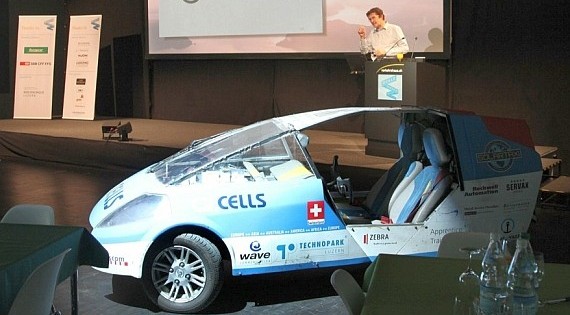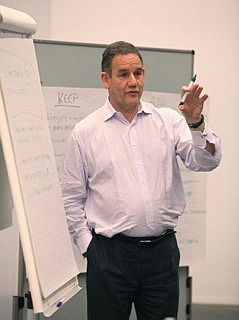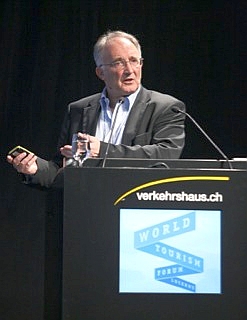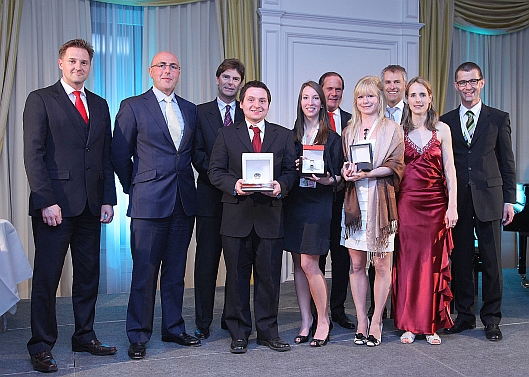2nd World Tourism Forum Lucerne discussed global sustainability
 |
|
| With a solar-mobile around the world: Swiss Louis Palmer drew people''s attention to alternative energy. |
Lucerne (April 22, 2011). The path to a sustained world is still broad, very broad. The world still exists in contradictions: The rich west thinks about it, but does not want to pay for it. "Emerging markets" ask only for material prosperity and up to now, the discussion there about "sustainability" takes place only with a few heads of the uppermost hierarchy. On the one hand, the first "green" hotels and tourism concepts are sprouting up and on the other hand, there are always new low-cost airlines originating that seek only growth. And the desire for global travel rises and rises … In closing, these were the great contradictions in sustainability development that got stuck in the minds of the approximately 200 participants of the 2nd World Tourism Forum Lucerne (WTF) last week. And the knowledge that even the executives who were present in Lucerne cannot (still) change very much. Concrete knowledge or even decisions were missing in the end. But there were also too few potent decision makers present.
 |
|
| Christopher Rodrigues. |
At the end of the 2 day conference, the Swiss "environmental adventurer", Louis Palmer displayed photos of the eager people who received him on his world trip with a solar-mobile. He sowed a sustainability seed and drew attention to alternative energy. The PR effect was great.
The reality is more sober. The beginning debate clearly poked a finger in the wound - in the contradiction between growth/profit and sustainability. "Growth is not sustainable," immediately clarified Tim Jackson, economist with the British Sustainable Development Commission. His idea: Economic prosperity without growth. His solution proposal: Efficiency increases powered by technology!
"We live on a restricted planet", he sent an urgent reminder. An immense growth in population stands in opposition: In 2050, there will be nine billion people. According to UNWTO, 1.6 billion will already be travelling in 2020. Everybody wants to profit from the growth. This clashes with all goals one has set for their self up to now. Therefore, Jackson pleaded for a new mentality - "Tourism of the mind".
Think big!
All discussions quickly showed that the conference members are absolutely aware of their responsibility and hold a change in thinking as urgently necessary. The call for global agreements was quick regarding the overhauling of the ownership rules that occurred at airlines, e.g., (they still come from the 40s), regarding take-off taxes that flow back as "green" taxes and regarding the ending of consumption (leasing instead of purchasing).
"Nevertheless, 80 percent of the challenges in the tourism industry cannot be solved at all by tourism professionals!” participant, Klaus Lengefeld of GIZ (formerly GTZ) interjected. Example: A hotel pays for waste disposal, but nevertheless, the garbage lands in a field … "Tourism ministers have no influence on relevant factors, e.g., on the taxation within the country or on the quality of the water", acceded Christopher Rodrigues, Chairman of VisitBritain.
 |
|
| Prof. Geoffrey Lipman. |
The discussions became repeatedly entangled in the details in both the small as well as the large circles; the appeals occurred analogously to "think big." Finally, the gap between the poor and the rich will grow through the population explosion doubling consumption - "consequently we must triple our efficiency!" demanded Stephan Farrant, Director of International Tourism Partnership. According to World Bank, the demand for fresh water will already be 15% higher in 2020 than the resources can provide - and in future, the resource shortages will double every 20 years. "We need a revolution of innovation," says Farrant.
The song of the future is called ''green growth''
"Individual questions are not relevant," also postulated then, Prof. Geoffrey Lipman, Adviser to the Secretary General of the UNWTO and Director of greenearth.travel. In the end, tsunamis, political riots and nuclear disasters as experienced during the last months could throw all climate concepts and calculations onto the heap. The climate change will influence all levels of the life. "Take heed of the figures on how many hotels do or do not contribute to climate development, take heed of the figures and listen … The song of the future is called ''green growth''!".
There is a maximum of 40 years to educate the young people to this way of thinking – to integrate the perspective on things. In tourism, this indicates newly analysing products, markets, consumers, supply chains, distribution, brands and investments. Mobility, destinations and lifestyle must be continually scrutinized and newly interlinked. Individual actions and initiatives span through all industries, including tourism. However, the large business models for it are absent.
 |
|
|
Young Talents (from left): Benno Kueng, Bucherer AG; |
Future by the youth
Only at the beginning and at the end of the conference another important factor was clearly demanded: The time. If nothing seriously changes in coming decades, the next generations will suffer. Therefore, Lipman pleaded for "education and training as a policy" of the coming years.
The World Tourism Forum had recognised the meaning of the youth regarding this subject and had laid a program main focus on "Young Talents". Tourism students of six international partner universities or colleges were required to qualify for an invitation to the conference; three of them received a prize. Kempinski-CEO Reto Wittwer, COO, Duncan O''Rourke and Talent Manager, Henrike Gosemann supported this initiative idealistically and through their presence. (Other reports follow.) / Maria Puetz-Willems
|
Is there a demand for sustainable tourism? Supported by the Swiss tour operator, Kuoni, the Tourism Institute of the Lucerne College and the Data Research Institute, IPK International, from Munich investigated the demand for sustainable tourism. 750 answers by people from eight countries (Brazil, Germany, India, Russia, Sweden, Switzerland, Great Britain, and the USA) proved, among other things, the following statements: ♦ Sustainable is equated with "local" - with local products, local culture and the local community. |
To print this article you have to be registered and logged in for newsletter, visitor or subscription.





